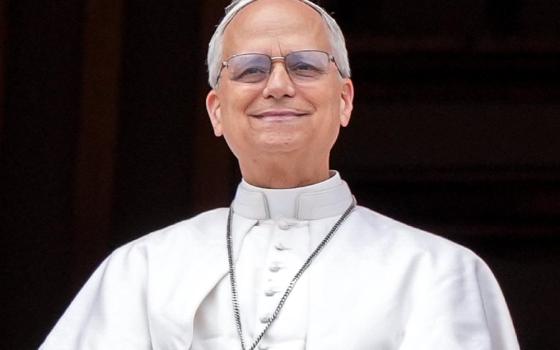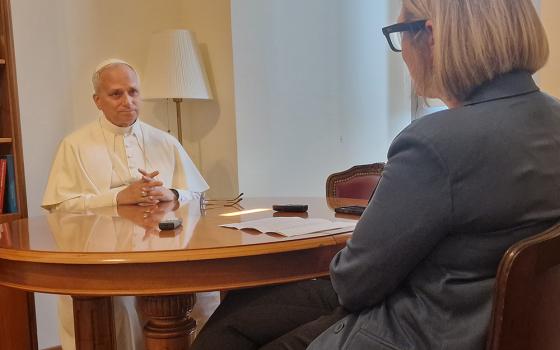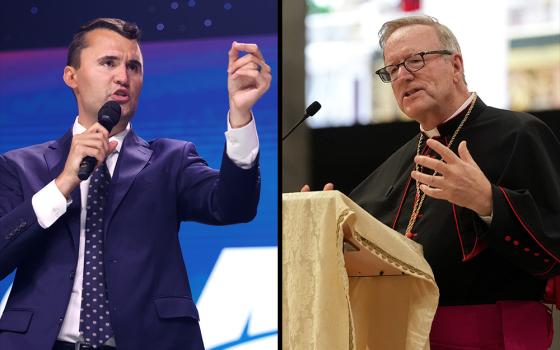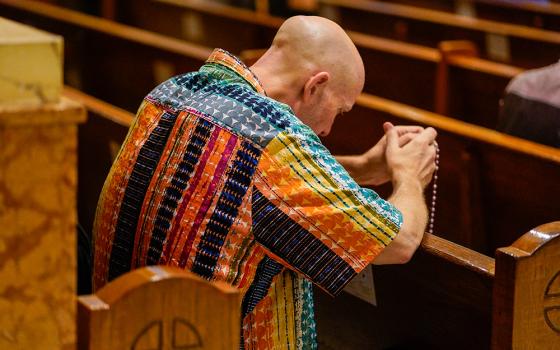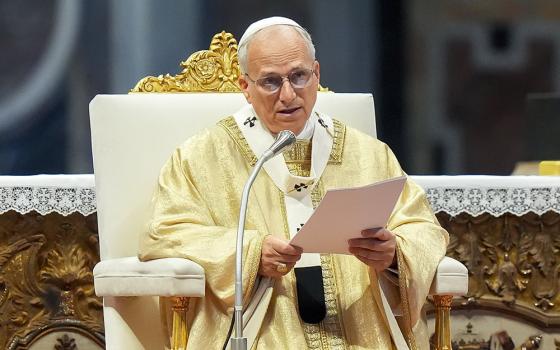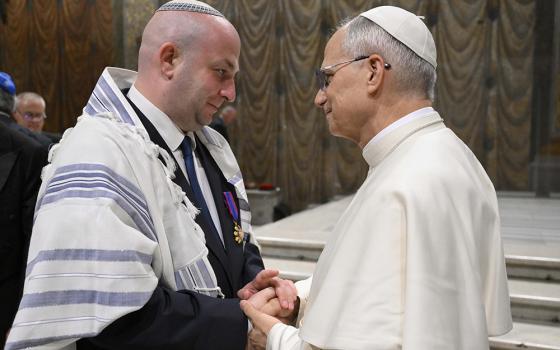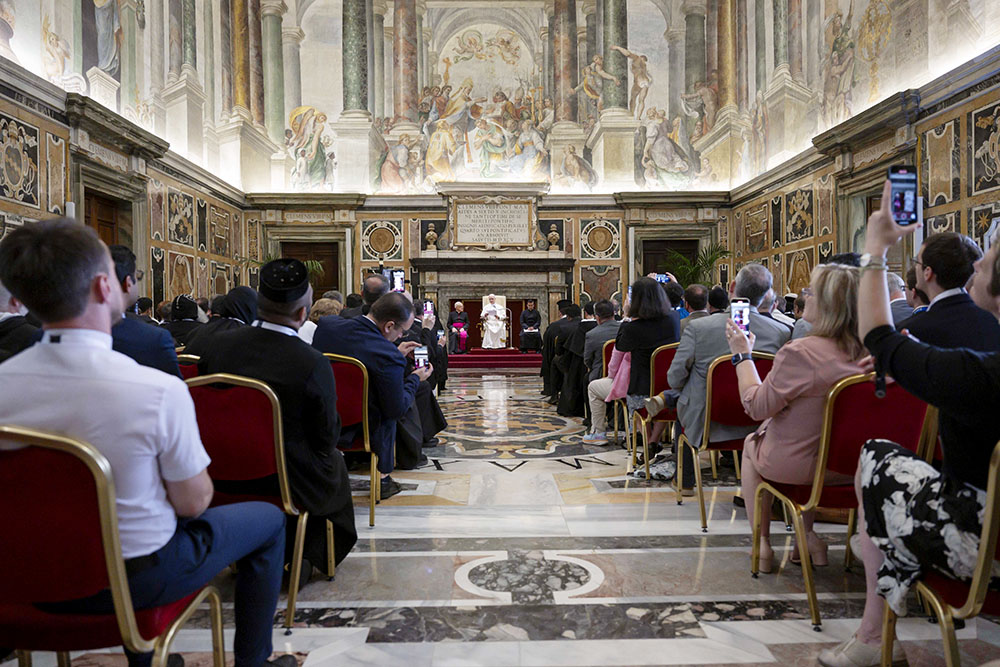
Participants take photos of Pope Leo XIV during his audience with people attending a conference on the ecumenical implications of the 1,700th anniversary of the Council of Nicaea June 7, 2025, in the Clementine Hall of the Apostolic Palace at the Vatican. (CNS/Vatican Media)
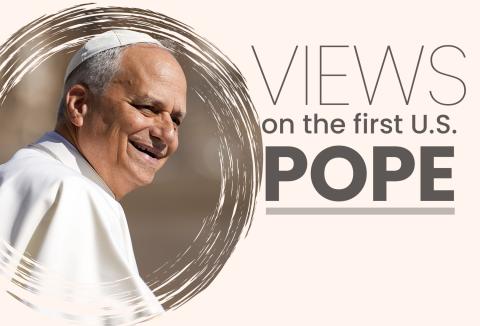
My day job is theology professor, but my introduction to Pope Leo XIV came while moonlighting as a journalist. As a special correspondent for Baptist-related Good Faith Media, I was in Rome to cover the conclave, along with the last few days of preparations for it and the first few days of the new pontificate.
As a Baptist ecumenical theologian who serves as co-secretary for the Baptist-Catholic dialogue joint commission, I am keenly interested in how the pope, whomever he may be, might live into the hope that the papacy could be of service to all Christians. This hope was articulated by Pope John Paul II in Ut Unum Sint and reiterated last year in the Dicastery for Promoting Christian Unity study document on "The Bishop of Rome."
There are two ways to frame Baptist identity in relation to the whole church. Both have roots in the journey of John Smyth, co-founder of the first Baptist congregation in 1609 in Amsterdam. He sought to establish his community as a true church, and not finding any other communities that qualified as such from which he and his coreligionists might receive a true baptism, Smyth baptized himself and then the other members of his church.
But a year later he concluded that the local Mennonite fellowship was in fact a true church and sought to join it along with a portion of his congregation. While some Baptists have regarded other Christian traditions as lacking the marks of the true church, as Smyth initially thought, many others have followed his subsequent rethinking in recognizing the authenticity of church wherever it may be found.
In this latter perspective, the Baptist movement is a renewal movement within the one church of Jesus Christ with a charism of ecclesial freedom in covenanted local community — not unlike religious orders following a distinctive rule for their life together. My Baptist hopes for the pontificate of Leo XIV are related to his connections with various renewal movements within the one church.
Monasticism originated as just such a renewal movement. I find Leo's Augustinian identity, which has permeated his early addresses, promising for a papacy that serves as an instrument of ecclesial renewal, not only for the Catholic Church but for all churches. His explicit embrace of Pope Francis' vision of a more fully synodal church seems connected to an Augustinian emphasis on the virtue of listening for the voice of God in the voices of the community.
As the synod on synodality's conferences on synodality in different Christian traditions demonstrated, there are practices of synodality in other churches, Baptists among them. The Baptist practice of ecclesial discernment by listening to the voices of the whole local congregation is one such practice, and in its ideal exercise it seeks to listen to a wide range of voices beyond the local church.
I hope that Leo will inspire all Christians toward church-renewing practices of deep listening through modeling the listening that several cardinal electors reportedly recognized as one of his strengths.
The missionary movement has contributed much to the renewal of the church across its history. Baptist participation in the modern missions movement has deeply influenced Baptist identity. The Catholic Church was of course a missionary church long before the modern missions movement.
Advertisement
Leo's background as a missionary priest, seminary professor and bishop in Peru positions him well for leading the church to heed his summons in his initial urbi et orbi message to be a missionary church. I hope his leadership will renew the missional commitment of the whole church, which includes Baptists.
The modern ecumenical movement that sprang initially from the modern missions movement has likewise been a source of renewal for churches. Leo has related his papal motto, "In the One, we are one," to his concern for the ecumenical renewal of the whole church.
I am trying to resist the temptation to read too much ecclesiological precision into Leo's reference to "sister Christian churches" rather than "ecclesial communities" in his inaugural Mass homily with the guest ecumenical representatives seated before him. But I was nonetheless deeply moved by this language, and I hope it anticipates an ecumenically engaged papacy.
The American identity of this pope has potential for the renewal of American Christianity in particular by calling us beyond our captivity within a polarized politics toward a fuller participation in the reconciling peace of the reign of God. He has already inspired me to strive to resist positioning myself in relation to the polarized categories of both American civil and ecclesial life.
This Baptist is hopeful that the pontificate of Leo XIV contributes to the renewal of the one church of Jesus Christ in each of these ways and more.

